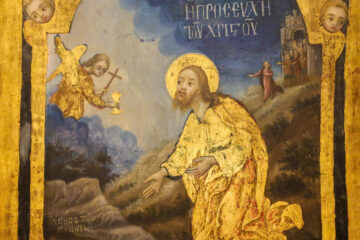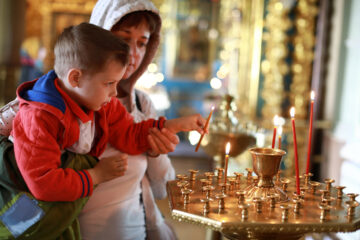Archimandrite Theofilos Lemontzis, D. Th.
‘The storms of life swarm round me like bees round a honey-comb and have taken possession of my heart, while spears of afflictions pierce me’. Thus sings the hymnographer in the Great Supplicatory Canon. He compares the cares of daily life with bees. Just as bees make a humming noise in the hive by the movement of their wings, so the cares of daily life swarm round us, giving us no peace, day or night. They torment us and bring us to despair.
At the same time however, the hymn-writer- and we ourselves- set our hope on our Lady, the Mother of God: ‘And where, then shall I find other defence? Where shall I flee? And where shall I be saved? What other fervent helper shall I have in the tribulations and storms of life which have so buffeted me? In you alone do I hope, draw courage and boast and I hasten to find sanctuary with you: save me’. In other words, we recognize that there’s no other anchor of hope, no other fervent helper, and that our only recourse is to the embrace of our sweetest Mother, our Lady.
There are many reasons why our souls aren’t at peace. We have to deal with lots of problems and our souls are often wounded by trials from the past and fears for the future. How are we to face unexpected and unforeseen difficulties? How will we be able to respond to economic hardships? How can we wean a relative off some kind of addiction? How can we restore peace to our home so that the strife and quarrels cease? How can we find a solution to all of this? It’s natural that these states should concern our soul, plunge it into dark thoughts and cause feelings of anxiety. They don’t allow us to be peaceful and tranquil. This is why we entreat that our Lady will give us peace: ‘Bring peace, Maiden, through the tranquility of your Son and God, spotless one’. Precious peace and calm reign in our soul when we follow the words of Christ, who urges us to entrust all the issues in our life to divine providence. Saint Porfyrios Kavsokalyvitis teaches us: ‘You know that the scriptures says that the hairs of our head are numbered. That’s the reality. That’s the way it is. Nothing in life’s coincidental. God takes care of the minor details of our life. He’s not indifferent towards us; we aren’t alone in the world. He loves us very much, he’s always concerned about us and protects us’.
Trust in divine providence fills the soul with spiritual joy (which is the antidote to sorrow and depression) and engenders hope, which is nourished by our faith, our trust in God: ‘for we were saved in hope’ (Rom. 8, 24). Hope gives us the strength to face life’s difficulties; it represents the certainty that God will intervene immediately. Without this hope, our life would be full of disappointment and unhappiness.
Saint Païsios the Athonite teaches us that, ‘those who are aware of God’s blessings learn to be dependent on divine providence’. We’ll mention here an incident in his life which proves how our Lady provides for all of us. When he was at the Monastery of Filotheou, immediately after the vigil for the Dormition of the Mother of God, one of the overseers sent him to do a job outside the monastery. He’d been fasting for days- essentially not eating at all- and hadn’t managed to eat after the vigil, so he felt faint as he was walking because he was exhausted from his ascetic efforts. He was in despair and stopped to rest for a while, trusting in our Lady’s providence to arrange a little food for him. Then he saw a monk standing in front of him with a round loaf, two figs and a large bunch of grapes. ‘Take these, to the glory of our Lady, the Mother of God’, he said and disappeared. Saint Païsios burst into tears. He couldn’t bring himself to eat, and recognized the providence of our Lady. ‘What a mother she is. To take care of the smallest details like that. Do you know what that means?’.
Let us also set our hope on the sleepless intercessions of our Lady and let us recall how many times she’s stood by us, how many times she’s solved our problems, how often she’s saved us and arranged successful outcomes, so that we may raise our voices and confess: ‘You have truly worked wonders for me, Lady, with your well-doing and your mercies; therefore Maiden, I glorify you, and praise and honor your great and immeasurable care’.
Source: pemptousia.com




0 Comments